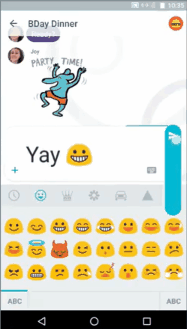Google Allo
 | |||||
 A screenshot of Allo, showing the "smart reply" feature | |||||
| Developer(s) | |||||
|---|---|---|---|---|---|
| Initial release | September 21, 2016 | ||||
| Stable release |
| ||||
| Operating system | Android, iOS | ||||
| Available in | English | ||||
| Type | Instant messaging | ||||
| Website | allo | ||||
Google Allo is an instant messaging mobile app developed by Google. It includes a virtual assistant and provides a "smart reply" function that allows users to reply to messages with automatic suggestions instead of typing.[3] It was announced at Google I/O on May 18, 2016,[4] and launched on September 21, 2016.[5] The app is available on Android and iOS.[5]
Before launch, Google touted strong privacy in the app, with particular emphasis on messages stored "transiently and in non-identifiable form".[6] However, at launch, privacy was significantly rolled back, with Google now keeping logs of messages indefinitely (or until the user actively deletes messages) in an effort to improve app features.[6] Additionally, privacy advocate and NSA whistleblower Edward Snowden was critical of Allo using unencrypted chat messages by default, with an opt-in feature for full encryption, rather than fully encrypted by default, writing on Twitter that "Google's decision to disable end-to-end encryption by default in its new #Allo chat app is dangerous, and makes it unsafe. Avoid it for now."[7]
History
Allo was announced at Google I/O on May 18, 2016.[4] At the time, Google said that it would release Allo in summer 2016.[8] Google launched the app on September 21, 2016.[5] It was mentioned during the #MadeByGoogle event in October 2016 that Allo will be pre-installed on Pixel phones, along with its sister app, Google Duo.[9]
Features
Allo is based on phone numbers, not by social media or email accounts.[10]

Allo's "Smart reply" function uses Google's machine learning technology to suggest a reply to the last message, which can be selected from a few options. The feature also analyzes images sent to the user in order to suggest responses. Similar to the smart reply feature seen in Google's Inbox app, it learns from the user's behaviour to adapt its suggestions over time.[3] Allo is one of the apps that support Google Assistant, a conversational virtual assistant.[5]
"Whisper Shout" allows the user to increase or decrease the size of a message to represent volume.[11]
Allo also lets users draw on photos before sending them.[5]
Incognito mode
Incognito mode is an optional mode that includes expiring chats, private notifications, and end-to-end encryption. For encryption, the app uses the Signal Protocol.[12]
Incognito mode does not include any Smart Reply or Google Assistant features. When the user receives a sticker from a sticker pack that they do not already have installed on their device, the app will retrieve the sticker from Google’s servers using security, but not end-to-end encryption.[13]
Reception
Virtual assistant
PC World’s Mark Hachman gave a favorable review of Allo's virtual assistant, saying that it was a "step up on Cortana and Siri".[14]
Optional encryption
Following Allo's introduction at Google I/O, Google was criticized by security experts and privacy advocates for having the end-to-end encryption turned off by default, which they argue leaves the app open to government surveillance.[12][7] Edward Snowden, whistleblower and former NSA contractor, criticized the app on Twitter, saying that "Google's decision to disable end-to-end encryption by default in its new #Allo chat app is dangerous, and makes it unsafe."[7][15]
Thai Duong, a co-lead of Google's product security team, wrote in a personal blog post that he would push for the addition of a setting that would let users have the encryption on all the time.[16] However, he later retracted the statement.[17]
Message retention
When Allo was first introduced, its developers talked about storing non-incognito messages only transiently[8][6] — namely that the messages would be deleted from Google's servers after they had been delivered to their destination. At launch, Google revealed that they would instead store all non-incognito messages indefinitely (or until the user actively deleted them) in order to improve the built in "smart reply" feature.[6] Russell Brandom of The Verge commented that "the decision will have significant consequences for law enforcement access to Allo messages. By default, Allo messages will now be accessible to lawful warrant requests, the same as message data in Gmail and Hangouts".[6]
See also
References
- ^ "Google Allo". APKMirror. Android Police. March 14, 2018. Retrieved March 14, 2018.
- ^ "Google Allo". App Store. Apple Inc. March 13, 2019. Retrieved March 13, 2019.
- ^ a b Lee, Nicole (May 19, 2016). "Please don't send me Smart Replies". Engadget. Retrieved December 15, 2016.
- ^ a b Lunden, Ingrid (May 18, 2016). "Google debuts Allo, an AI-based chat app using its new assistant bot, smart replies and more". TechCrunch. Retrieved December 15, 2016.
- ^ a b c d e Gibbs, Samuel (September 21, 2016). "Google launches WhatsApp competitor Allo – with Google Assistant". The Guardian. Retrieved December 15, 2016.
{{cite web}}: Italic or bold markup not allowed in:|publisher=(help) - ^ a b c d e Brandom, Russell (September 21, 2016). "Google backs off on previously announced Allo privacy feature". The Verge. Retrieved December 15, 2016.
{{cite web}}: Italic or bold markup not allowed in:|publisher=(help) - ^ a b c Tung, Liam (May 20, 2016). "NSA whistleblower Snowden: Google Allo without default encryption is 'dangerous'". ZDNet. Retrieved December 15, 2016.
- ^ a b Bohn, Dieter (May 18, 2016). "Allo is a messaging app with Google built right in". The Verge. Retrieved December 15, 2016.
{{cite web}}: Italic or bold markup not allowed in:|publisher=(help) - ^ Rakowski, Brian (October 4, 2016). "Introducing Pixel, our new phone made by Google". The Keyword Google Blog. Google. Retrieved December 15, 2016.
- ^ Geuss, Megan (May 18, 2016). "Google's Allo and Duo are 2 communication apps based on your phone number". Ars Technica. Retrieved December 15, 2016.
{{cite web}}: Italic or bold markup not allowed in:|publisher=(help) - ^ Beres, Damon (May 18, 2016). "Google Debuts A New Texting App You'll Actually Want To Use". The Huffington Post. Retrieved December 15, 2016.
{{cite web}}: Italic or bold markup not allowed in:|publisher=(help) - ^ a b Greenberg, Andy (May 18, 2016). "With Allo and Duo, Google Finally Encrypts Conversations End-to-End". Wired. Retrieved December 15, 2016.
{{cite web}}: Italic or bold markup not allowed in:|publisher=(help) - ^ "Chat in private with Incognito mode". Google Allo Help. Google. Retrieved December 15, 2016.
- ^ Hachman, Mark (September 22, 2016). "Hands-on: Google Assistant's Allo chatbot outdoes Cortana, Siri as your digital pal". PC World. Retrieved December 15, 2016.
{{cite web}}: Italic or bold markup not allowed in:|publisher=(help) - ^ Hackett, Robert (May 21, 2016). "Here's Why Privacy Savants Are Blasting Google Allo". Fortune. Retrieved December 15, 2016.
{{cite web}}: Italic or bold markup not allowed in:|publisher=(help) - ^ Conger, Kate (May 19, 2016). "Google engineer says he'll push for default end-to-end encryption in Allo". TechCrunch. Retrieved December 15, 2016.
- ^ Goodin, Dan (May 20, 2016). "Incensing critics, Google engineer ends push for crypto-only setting in Allo". Ars Technica. Retrieved December 15, 2016.
{{cite web}}: Italic or bold markup not allowed in:|publisher=(help)
